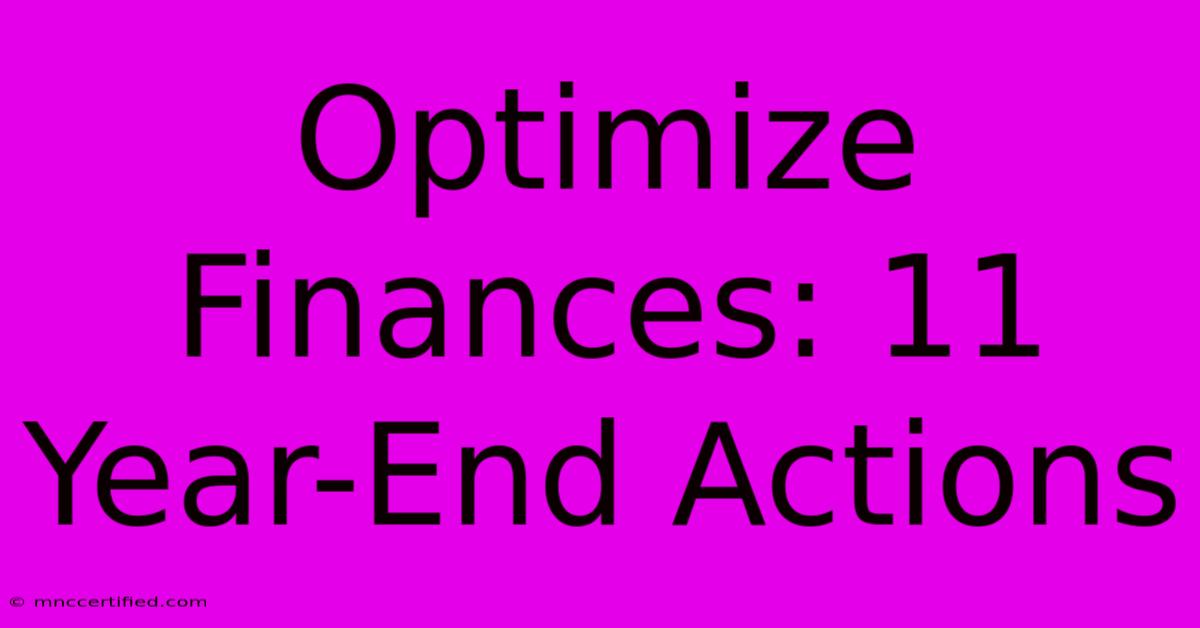Optimize Finances: 11 Year-End Actions

Table of Contents
Optimize Finances: 11 Year-End Actions to Secure Your Future
Year-end is the perfect time for financial reflection and proactive planning. Taking control of your finances now sets the stage for a more secure and prosperous future. This guide outlines 11 crucial year-end actions to optimize your financial health. Let's dive in!
1. Review Your Budget and Spending Habits
Before making any significant financial moves, honestly assess your spending habits throughout the year. Did you stick to your budget? Where did you overspend? Analyzing your spending patterns helps identify areas for improvement and prevents similar issues next year. Utilize budgeting apps or spreadsheets to track your income and expenses meticulously. Keyword: Budget analysis
2. Maximize Retirement Contributions
Year-end is often the last chance to maximize contributions to your 401(k), IRA, or other retirement accounts. Check contribution limits and make any necessary adjustments to fully utilize tax advantages and accelerate your retirement savings. Don't underestimate the power of compound interest; even small increases can significantly impact your long-term financial security. Keywords: Retirement planning, 401k, IRA, tax advantages
3. Harvest Investment Losses (Tax Loss Harvesting)
If you experienced investment losses during the year, consider tax loss harvesting. This strategy involves selling losing investments to offset capital gains, potentially reducing your tax liability. Consult with a financial advisor to understand the implications and strategize effectively. Keywords: Tax loss harvesting, capital gains, tax optimization
4. Review and Adjust Your Insurance Coverage
Ensure your insurance coverage (health, life, auto, home) still meets your needs. Life changes, such as marriage, having children, or purchasing a new home, may necessitate adjustments to your policy. Review your deductibles and premiums for potential savings. Keywords: Insurance review, health insurance, life insurance, auto insurance, home insurance
5. Pay Down High-Interest Debt
High-interest debt, such as credit card balances, can significantly hinder your financial progress. Prioritize paying down these debts aggressively to reduce interest payments and improve your credit score. Consider debt consolidation strategies if managing multiple debts proves challenging. Keywords: Debt management, credit card debt, debt consolidation, credit score
6. Check Your Credit Report
Review your credit report for any errors or inconsistencies. Addressing any issues promptly protects your credit score and ensures you receive favorable interest rates on future loans. You're entitled to a free credit report annually from each of the three major credit bureaus (Equifax, Experian, and TransUnion). Keywords: Credit report, credit score, credit repair
7. Plan for Major Purchases
If you're planning significant purchases next year, such as a car or a house, start saving and researching financing options now. This allows you to shop around for better rates and avoid impulsive decisions. Keywords: Financial planning, budgeting for purchases, car loan, mortgage
8. Contribute to a Health Savings Account (HSA)
If you have a high-deductible health plan, maximizing contributions to a Health Savings Account (HSA) offers significant tax advantages. These funds can be used for qualified medical expenses and grow tax-free. Keywords: HSA, Health Savings Account, tax-advantaged savings
9. Update Your Beneficiaries
Ensure your beneficiaries on all your accounts (retirement accounts, insurance policies, bank accounts) are up-to-date. This crucial step protects your loved ones in the event of an unforeseen circumstance. Keywords: Beneficiary designation, estate planning
10. Schedule a Meeting with a Financial Advisor
A financial advisor can provide personalized guidance based on your individual circumstances and goals. They can help you create a comprehensive financial plan and monitor your progress towards achieving your objectives. Keywords: Financial advisor, financial planning, wealth management
11. Set Financial Goals for the New Year
Use your year-end review as a springboard to set realistic and achievable financial goals for the coming year. Whether it’s increasing your savings rate, paying off debt, or investing in your education, clearly defined goals provide direction and motivation. Keywords: Financial goals, New Year's resolutions, financial planning
Conclusion:
Optimizing your finances at year-end is an investment in your future well-being. By diligently following these 11 actions, you'll strengthen your financial position and pave the way for greater financial security and peace of mind. Remember, consistency and proactive planning are key to achieving long-term financial success. Don't hesitate to seek professional advice when needed.

Thank you for visiting our website wich cover about Optimize Finances: 11 Year-End Actions. We hope the information provided has been useful to you. Feel free to contact us if you have any questions or need further assistance. See you next time and dont miss to bookmark.
Featured Posts
-
Auto Insurance Pittsfield Ma
Nov 30, 2024
-
Black Friday Deals Maga And More
Nov 30, 2024
-
Connors Targets Ireland Return
Nov 30, 2024
-
Zepbound Denied By Insurance
Nov 30, 2024
-
Close Irish Election Vote Counting
Nov 30, 2024